|
Spring in South Louisiana is a vibrant season, filled with warm weather, blooming flowers, and the return of greenery. However, it also marks the return of various pests that can become nuisances to homeowners and gardeners alike. Understanding which pests to look out for during this season is crucial for effective pest control and ensuring your outdoor activities remain enjoyable. This blog post will guide you through the common pests that emerge in South Louisiana during spring and offer tips on managing them. Termites
South Louisiana is notoriously known for its termite activity, particularly in the spring when these pests swarm to start new colonies. The warm, humid climate of the region provides an ideal environment for Formosan and subterranean termites, which are particularly destructive. These termites can cause significant damage to homes and other structures, often unnoticed until it's too late. To prevent termite infestation, homeowners should:
Mosquitoes The spring rainfalls in South Louisiana create perfect breeding grounds for mosquitoes. These pests are not only annoying but can also pose health risks by transmitting diseases such as West Nile Virus and Zika Virus. To combat the mosquito population, individuals can:
Ants As the ground warms up in spring, ant activity increases. Fire ants, in particular, are common in South Louisiana and can deliver painful stings. Carpenter ants, which burrow into wood to create their nests, can also be a problem, potentially damaging wooden structures in and around your home. To deter ants, consider the following:
Rodents Rodents, such as mice and rats, may seek shelter in homes as they emerge from their winter hiding spots. These pests can damage property, contaminate food, and spread diseases. To prevent rodent infestations, homeowners should:
Cockroaches Cockroaches thrive in the warm and moist environment that spring in South Louisiana offers. These pests can enter homes in search of food and water, potentially spreading bacteria and allergens. To keep cockroaches at bay:
Tips for Managing Spring Pests in South Louisiana Managing pests requires a combination of preventative measures and timely action. Here are some additional tips to help keep your home pest-free:
Spring in South Louisiana is a beautiful time of year, but it also brings challenges in the form of various pests. By staying vigilant and implementing effective pest control measures, you can enjoy the season without the nuisance and potential harm these pests can cause. Remember, the key to pest management is prevention, early detection, and appropriate action.
1 Comment
Mosquitoes are one of the most common pests, especially during Louisiana's warmest months. If you often find yourself swatting at these little pests, you might want to plan ahead for mosquito season. With a few precautionary measures and some professional assistance, you can enjoy your outdoor spaces in the spring and summer months, free from mosquitoes.
When Is Louisiana's Mosquito Season? The season for mosquitoes occurs when the conditions for the invading insects are ideal. These flying pests love heat and moisture, so the season for them can last anywhere from spring to fall. If you want to stay on top of preparing your property, start your precautionary measures around April and plan to maintain them until October. The actual timing varies depending on the year, but it is a safe bet to say that the season for mosquitoes in Louisiana lasts about seven months. How Can You Prepare for Mosquito Season? Whether the season for these annoying insects is months away or right around the corner, you can take some simple, practical steps to prepare. Here are some easy ways to get started. 1. Remove Standing Water Eliminating moisture is one of the first steps the Centers for Disease Control and Prevention recommends when preparing for mosquito season. Since mosquitoes lay eggs near water, you can prevent potential infestations by draining standing water sources on your property. Keeping your outdoor spaces free of moist areas gives mosquitoes fewer places to lay eggs and multiply. 2. Keep the Air Moving Mosquitoes are notoriously weak fliers, so creating maximum ventilation in your outdoor space is an effective way to repel them. If you don't have a natural breeze that flows through your property, try keeping a few fans handy in areas that you use frequently. Not only will ventilation keep the mosquitoes away, but it also keeps you cool. 3. Check Your Gutters If you need another excuse to keep your gutters clean, add mosquito prevention to the list. Your gutters are another common area where moisture can collect, attracting mosquitoes and giving them a place to lay eggs. Additionally, functional gutters should help keep water from pooling around the edges of your house and attracting further pests. Stay on top of your gutters by cleaning them regularly yourself or retaining a service to do this. 4. Hire an Exterminator The most effective step you can take to protect yourself from mosquitoes is to enlist professional help. A trusted and experienced exterminator can treat your property for pests and give you advice on how to maintain your space during mosquito season. If you're serious about prevention, you can look into our mosquito misting system, which reduces the presence of mosquitoes by 98% in the first week of use. If you've taken precautionary measures and want to make sure all your bases are covered, an exterminator can make sure you're fully protected. Take the Next Steps You're now prepared to take on Louisiana's mosquito season. Check out our services for mosquito control and enlist the help of southern Louisiana's most trusted exterminator. There are an estimated 90,000 mosquito misting and automated insect control systems currently installed in the United States. The number of systems alone is a testament to how well mosquito misting systems take care of mosquitoes, no-see-ums, and other flying insects. If you enjoy spending time in your own yard - swimming in the pool, grilling on the patio, or having a party with friends on the deck - you should be able to do so without swatting. Below we'll explain why there isn't a better option to enjoy your outdoor space bite free than a mosquito misting system. Automatic
A mosquito system is will treat your mosquito population on a timer. You will forget how often you got bit since it will seem like there aren't any mosquitoes in your yard. Treats When Mosquitoes are Active Mosquitoes are most active at dawn and dusk. Fogging treatments and other control measures are applied when the technician has the time to come. Midday treatments are more likely to affect non-target species like butterflies and honey bees. Between 30 to 60 Seconds The recommended misting time is between 30 and 60 seconds. That's it! The precision engineered misting nozzles project a fine mist that takes care of flying insects. Less Area Properly installed mosquito systems mist the perimeter of your property and the plants where mosquitoes reside. This is better than a backpack fogging mosquito treatment. High Quality Parts Bug Ninja Mosquito Systems only use high quality parts that ensure a long use life. They operate as intended for years and resist corrosion and sun damage. You can choose between an innovative tankless system or a traditional misting model requiring a drum. Do mosquito systems work? Yes they do. We beleive they are the best option for you to control mosquitoes at your home. If you are interested in a mosquito system request a quote or give us a call today. Southern Louisiana, with its warm, subtropical climate, is a favorite spot for vacationers. It is also a prime destination for insects. They thrive in the moist climate, and the topography provides many places for them to live. Like humans, insects want to be left alone to find shelter, eat food, mate, and raise young. When the worlds of humans and insects collide, though, some biting and stinging bugs will defend themselves, however reluctantly. In certain cases, you may want to consider pest control services. In southern Louisiana, it is a good idea to ask this important question: Will it bite? Mosquitoes In short, yes. However, mosquitoes do not actually bite. Rather, female mosquitoes insert a straw-like mouthpart through and under your skin in order to feed. Your body instantly reacts to a substance the mosquito releases just beneath your skin, and your immune system kicks into action. It sends histamine, which makes blood vessels swell, causing the characteristic bumps you see after a close encounter with a mosquito. Nearby nerves become irritated from the swollen vessels, resulting in an itching sensation. Termites Not likely. In general, termites feast upon wood rather than humans. Soldier termites, though, can become biting bugs if they feel they are under attack. Therefore, bites from these termites only happen when they are severely threatened. This is a case where it is best to leave these insects alone and hire professional for termite pest control. Ticks Yes. After a tick gets on your body, it generally settles in your hair, armpit, or groin. It will get comfortable and begin to take in blood, growing larger as it feeds. The tick may gorge for days, or in some cases weeks, before releasing its hold and falling off. Once attached, ticks do not roam around, nor does one tick make multiple bites. The best way to know if you have received a bite from a tick is to search your body. Ticks are generally harmless, but they can pose a danger to those who are allergic to them. Some ticks also carry viruses that can cause debilitating illnesses. Spiders
Unlikely. Spiders are not aggressive bugs. They only bite when they are feeling threatened. In fact, they do not want to have contact with you any more than you want to with them, and they will only bite in cases of accidental contact, such as a human reaching into a nook where a spider is hiding. Most spiders’ fangs cannot penetrate human skin. More sensitive individuals could sometimes experience localized swelling, redness, and pain should a bite occur when there is inadvertent contact (during the night while sleeping, for example), but many humans would not even notice a bite. There are more than 3,000 species of spiders throughout the United States, with only three of these considered dangerous to humans. All three of those species are found in Louisiana:
The best rule to avoid these bugs is to look before sticking your hand anywhere. Pay attention to your surroundings. One of the names says it all: recluse. These spiders want to find quiet places, and they only bite if they feel severely threatened. Leave them alone, and they are more than happy to return the favor. Stink Bugs Probably not. So-called stink bugs are vegetable and fruit eaters, and they usually do not bother humans. Like other insects such as termites, they only bite if they feel severely threatened. Cockroaches Not likely. Cockroaches are generally not biting bugs. They may bite humans only in cases of severe food depletion, and even then they only target people who are sedentary. Ants Yes. Ants do bite. However, each species has its own type of “attack.” Sugar ants sometimes bite humans in defense, but their bites usually do not cause pain. Carpenter ants, however, can inflict painful bites if they are feeling threatened. Fire ants also bite, but it is their sting that has become infamous. They bite in order to grip their prey securely, then begin to sting. Fire ants can build huge mounds from which they swarm out if disturbed. They have been known to harm and even kill livestock. Bees No. Bees are not biting bugs but rather stinging insects. Female bees are the ones that can sting. When a honeybee stings, however, it pays the ultimate price: Its stinger becomes embedded in the human’s skin, and the bee dies. Queen bees retain their stingers and can sting multiple times, but they seldom venture out in the open and encountering one is not likely. Bumblebees are not hostile. When a female bumblebee feels severely threatened, though, it will caution you up to three times before stinging by raising and then straightening its middle legs and displaying its stinger. If you see this, back away from the bee, and it will not bother you. If a bumblebee is driven to sting, it retains its stinger and so does not die. Wasps No. Like bees, wasps are not biting bugs; they sting. Only the females attack humans, and their stingers do not detach, allowing them to sting multiple times during an assault. Like most insects, they become violent only to defend themselves when they feel they are in danger. They will not bite humans, but they can bite prey or objects when building a nest. Caterpillars No, but some sting. For example, the large American Dagger Moth is safe enough, but its caterpillars are bristly and will give anyone who gets too close an uncomfortable sting. Generally, if in doubt, do not touch. Insect Etiquette 101 Just like humans, insects in southern Louisiana want to feel safe while they go about their daily activities. Most biting bugs and stinging insects are not aggressive in themselves, as long as you respect their spaces and do not provoke them. In some cases, however, such as termite infestations, you may want to engage pest control professionals to prevent costly damage to your home or business. Other species, such as mosquitoes and ticks, feed on blood and will seek you out. A good rule is to leave insects alone and show consideration for their habitats, and teach children to do the same. The best way to coexist with insects is to carefully look but do not touch, and chances are they will not harm you. Almost everyone has lived through this situation. After several days of rain, the sun finally fights its way through the clouds and creates a lovely, warm day. With weather this nice, you can’t help but go outside. The day feels just about perfect, but soon your arm starts to itch. Then it’s your leg. Before long, your entire body feels like one giant mosquito bite. You rush inside in search of some relief from the swarm that ruined an otherwise wonderful day, and it’s at that point you realize that you need mosquito control. Nobody enjoys the nuisance of mosquito bites, and with over 60 different species in Louisiana alone, there are plenty of opportunities to be bitten. Besides being uncomfortable and itchy, mosquito bites can transfer nasty diseases like West Nile or Zika virus. While you could just hide under a mosquito net for the rest of your life, there are many other pest control options that can help limit the number the mosquitoes in and around your home. 1. Eliminate Standing Water
Even small collections of standing water on your property can provide a suitable environment for mosquitoes to lay their eggs. Standing water can accumulate in unexpected places. Poor drainage can result in puddles of water in your lawn. Unattended gutters, drain pipes and rain barrels can be problematic. Even something as simple as a watering can left outside can become a mosquito breeding ground. A simple solution for mosquito control is to eliminate these standing bodies of water through proper cleaning and maintenance. 2. Keep Your Grass Trimmed Mosquitoes enjoy thick vegetation and long, uncut grass. When grass is long, it takes more time for the dew to evaporate, which can attract more mosquitoes. A key to pest control is making sure you don’t fall behind on your landscaping duties. You may need to cut your lawn more than once a week, especially during the summer when grass can grow especially fast. While it may be tempting to cut your lawn extremely short, this could kill the grass by shocking it. While you are outside mowing, you can limit your exposure to mosquitoes by wearing light, long-sleeve clothing and working on a windy day. 3. Install Fountains in Ponds and Birdbaths Besides being an attractive addition to your property, fountains keep water moving and disrupt the mosquito breeding process. This is especially important if you have a small pond on your property, as mosquitoes may otherwise lay their eggs there. If you don’t want to install a fountain, installing a water agitator can still help with mosquito control. Fountains can also be an attractive and effective solution if you have a bird bath on your property and you don’t have time to consistently change the water. 4. Be Mindful of Your Pet’s Water Dish People love their pets, and nobody is asking you to deprive them of water. However, one thing you can do to help with mosquito control is to change your pet’s water dish frequently. This is especially important if you use a large water bowl. Instead of just topping off your pet’s water dish, empty the bowl down a drain and then refill it. This ensures that any mosquito eggs that were laid in the water are destroyed. Keeping an eye on the water dish is particularly important if your pet spends a lot of time outside. 5. Have Someone Watch Your House No, you shouldn’t hire someone to run around your property all day long trying to kill mosquitoes. As amusing as that may be, pest control doesn’t have to be that intensive. If you plan on being gone for a few days, having someone maintain your landscaping and being alert to problems of standing water can go a long way. Without someone watching your property, you might come back to a mosquito country club. 6. Keep Things Breezy Rather than have someone wave a giant tropical leaf at you, an easier option is to run a few electric fans to help with mosquito control. These tiny bugs are susceptible to wind and air changes, so running an overhead ceiling fan or a portable fan can keep the pests off you. Larger fans can even be used outside if nature isn’t generating enough natural air movement. 7. Patch Mesh Screens or Keep Windows Closed On nice days, it’s great to have the windows open. However, if there are holes in your windows or door screens, that’s an open invitation for mosquitoes to come inside. Replacing broken screens or just keeping your windows closed can cut down on the number of mosquitoes inviting themselves into your home for lunch. 8. Grow Mosquito-Repelling Plants Another way to tackle mosquito control is to work on your green thumb. In addition to looking and smelling nice, some plants can repel mosquitoes. If you were already planning on adding some greenery to your property, the following plants may help keep mosquitoes away: · Catnip · Feverfew · Citronella grass · Basil · Rosemary · Marigolds · Scented geraniums 9. Create a Dry-Ice Trap Mosquitoes are attracted to the carbon dioxide that people and animals exhale in the process of respiration. While you could simply hold your breath, this is not an effective long-term strategy. Instead, set a container of dry ice away from your house. Once you’ve attracted enough of the bugs with your trap, seal the lid. 10. Hire a Professional If you seem to be fighting a losing battle with mosquito control, it might just be time to hire a professional. A pest control professional can assess your individual property and help remove an infestation before things really get out of hand. Knowing when you need some outside help can save you time and frustration. Besides just being an uncomfortable pest, mosquitoes can be a health hazard. Rather than ignoring mosquito control, take charge of your home and get rid of these bugs. Pest control doesn’t have to be difficult, and understanding how to decrease the number of mosquitoes in and around your home can improve the quality of your life and make going outside an enjoyable experience again. It’s spring again, the time of year when we shake off the winter doldrums and welcome flowers, romance — and insects. Though the last aren't exactly welcome, they're certainly a part of spring in the city. Like their human counterparts, bugs love to emerge after a long winter’s nap for some fun in the sun. Unfortunately, that can translate to parties on your patio and luaus on your legs. While New Orleans doesn’t exactly go into the deep freeze the rest of the country faces, our shift in humidity and temperature still leads to a very real increase in bug activity come late March. Preparing for the seasonal uptick involves knowing what you’re facing and then talking to a qualified specialist in New Orleans pest control. Here are some ways to recognize the top spring pests in New Orleans. Figure out if they’re what’s bugging you! Buck Moth
The oak trees of New Orleans are a source of pride. Unfortunately, they’re also the exclusive home to a particularly troublesome spring pest known to New Orleans pest control specialists for its nasty stinging ways. It’s the buck moth caterpillar, and it’s one of the more annoying pests common to spring in the city. These innocent-looking guys are not a problem until they land on you and sting, which they may happen to do more often than you’d expect. These caterpillars are the larval stage of the buck moth, a striking brown and white moth that takes flight mostly during deer season. They lay their eggs around that time in oak trees. By spring, those eggs hatch and out come thousands of tiny, prickly caterpillars. The trouble comes when those caterpillars fall or crawl out of a tree and land on your unsuspecting shoulder. Their bodies are built with spines to ward off predators. These hollow needles release a poison that stings if it pricks your skin. Avoid their nip by staying out of the oak shade when possible. New Orleans pest control experts say if you do find yourself pricked, use Scotch tape to pull the spines out and sooth the pain with an ice pack. Roaches Heat, moisture and humidity — all the things that make a New Orleans spring sticky are the things that make it heaven for flying cockroaches. These classic pests thrive in just about any city, but New Orleans is especially favored due to its climate and the abundance of old buildings with lots of cracks and crevices in which to hide. In fact, Bloomberg named the Crescent City the most roach-infested in the nation in 2017. Experts say the lack of consistent freezing makes it hard to really put a dent in the city’s abundant population of these skittering creatures. They love to live in the leaf litter and bark of the live oaks that are abundant in the city, putting them in the perfect position to creep into a nearby house. Once there, New Orleans pest control specialists say roaches can survive by eating anything from paper to glue from stamps. Even spotless homes can be impacted if they have a leak or some other condition leading to a particularly damp environment. Because roach infestation can be so hard to manage, it’s best to contact a New Orleans pest control specialist when you see the first one, rather than trying to handle these critters yourself. Formosan Termites In New Orleans, Formosan termites have taken wood destruction to a level far beyond that of their native termite cousins. These insects are an invasive brand of the standard wood-chomping pest, first introduced from East Asia. Formosan termites thrive in muggy climates like Florida and Louisiana. In fact, they got so destructive in the French Quarter that the federal government sponsored a program to place termite baits and traps throughout the historic district. New Orleans pest control experts say a single colony can contain millions of termites, compared to just thousands for native subterranean termites. It’s typical to see swarms of these destructive creatures in early spring evenings. If you see them downtown, simply avoid them. However, if you see these pests near your home, it could be a very bad sign. Seal up your doors and windows and make a call to a trusted New Orleans pest control specialist with experience treating these troublesome bugs. Mosquitoes April showers may bring May flowers, but in New Orleans, they can also bring an uptick in those most common warm weather menaces, mosquitoes. The Crescent City has an especially nasty history with these bloodsuckers. In the early 19th and 20th century, yellow fever carried by these insects killed more than 41,000 men, women and children. Nowadays, mosquitoes are linked to West Nile Virus, which they can pass to humans after biting infected birds. Concern also has surrounded Zika virus. This mosquito-borne illness has been blamed for causing serious birth defects in pregnant women who become infected. Mosquitoes breed in standing water, which makes the Big Easy,with its low elevation and abundant swamp areas, an ideal site. Add in the increased humidity and rains with the change of seasons, and New Orleans pest control experts can tell you that you have a recipe for mosquito disaster. There’s no way to avoid mosquitos entirely, but there are plenty of smart options to minimize their numbers and impact. Remove standing water in containers around your home and address any drainage issues that can lead to pools of water. Make sure to keep open windows screened and limit time outside during dusk and dawn, when some species are especially active. If they are still a major problem, it may be time to talk to a New Orleans pest control specialist to investigate some of the more serious steps you can take. New Orleans is beautiful year-round, but especially in the throes of spring. Unfortunately, the beauty of the growing season doesn’t curtail the annoyance presented by pests. You don’t have to let insects spoil this time of year. Understanding what signs to look for can help you know when it’s time to call a New Orleans pest control specialist. Everything About MosquitoesEveryone knows about the blood sucking vampire mosquito. Let’s focus on the less talked about vegetarian mosquito. Once mosquitoes hatch from their eggs, they are called larvae. These little ones hang out just below the water and feed on algae. Once they get enough food, they grow into their next phase called pupae. Pupae mosquitoes don’t eat anything. They still hang out just under the water, but all they do is grow. Once they are done growing, they go up to surface of the water and fly away as the adult mosquitoes we all know and hate. All adult mosquitoes feed on flower nectar, rotting fruit, or plant honey dew as their primary form of nourishment. Mosquitoes only need sugar to live. Mosquitoes have a mouth mechanism called proboscis. It looks like a flexible, thin, long needle. The proboscis is really comprised of a number of different long needle like objects that split and search for blood once in the skin. Like antennae that split off from the main needle, whose main purpose is to locate blood and guide the main shaft to it. The male proboscis isn’t as complicated as the females since the male mosquito diet does not consist of any blood. The mosquito pumps saliva from its hypopharynx when biting you. This saliva has a numbing agent and an anticoagulant. This is why most people do not notice they are being bit. Once the mosquito saliva begins to wear off, it starts to itch and swell. This how we know we’ve been bitten. Female Mosquitos Bite Mr. mosquito lives completely off of a plant-based diet. Ms. mosquito only eats on you when she needs to produce eggs. Female mosquitoes have 2 stomachs. The front one is for storing and processing nectars and sugar. The rear stomach is for digesting blood. The rear stomach can hold enough blood for multiple broods of eggs. Female mosquitoes quit seeking animals to bite when the days start to get shorter. They focus on eating enough plant nectar to survive the winter while hibernating until spring. Most mosquitoes can produce about 10 eggs without your help. With the protein boost from your blood, they can produce about 100 eggs. Don’t feel too special. Besides the tiger mosquito, most prefer other animals such as blue jays, robins, sparrows, ducks, geese, and most other birds. They also get blood from rats, dogs cats, raccoons, possums, and coyotes. They can draw blood from lizards, snakes, frogs, and even fish! If mosquitoes prefer other animals to humans, then what is with all of the mosquito bites? Humans are much bigger than most of the other blood sources for female mosquitoes. We move around a lot, sweat a lot, and breath out a lot of carbon dioxide. Female mosquitoes can detect the carbon dioxide everyone exhales at a range of 75 feet! Female mosquitoes are opportunist. Even if you aren’t their favorite meal, you are right there and easy to reach. Plants Mosquitoes Hate There are some plants which repel mosquitoes. These plants include cedars, citronella grass, lavender, basil, bee balm, garlic, rosemary, clove, catmint, catnip, clove, lemon thyme, lemon scented geraniums, lemongrass, lemon verbena, lemon eucalyptus, Mexican marigold, and plenty more. Plant these if you enjoy the smell. Mosquitoes may not like them, but they want the other plants near them. Mosquito Environment Mosquitoes are drawn to locations that have standing water. It is where they can lay their eggs and get their population to grow. Those larvae need algae to eat when they hatch from eggs. If you have a lot of mosquito activity, check everywhere for standing water. Plants that hold water are a big breeding ground area for mosquitoes. Stagnant water in roof gutters, beneath wood decks, bird baths, and French drains are all areas that should be emptied or treated with mosquito control pellets. Mosquito Life Mosquitoes do not live very long. Male mosquitoes only live about a week. Female mosquitoes live longer than a month. A few varieties of mosquitoes hibernate throughout the entire winter. The female mosquitoes tend to eat more than male mosquitoes. Mosquitoes do act as pollinators. Pollen gets stuck in the eyes of mosquitoes as they drink the nectar of different plants. Mosquitoes are most active during dawn and dusk. There are over 3,000 species of mosquitoes in the world. They live on every continent except Antarctica. Over 150 of these species are in the United States. About 100 of these species are present in Louisiana. How to Avoid Mosquito Bites Strangely, mosquitoes are like you more if you wear dark colors. Wear lighter colors to steer mosquitoes toward someone else near you. Mosquitoes track you by the carbon dioxide from your breath and by your body’s scent. Mosquito repellents that work contain the product DEET. This is a man-made scent that mimics the scents that mosquitoes dislike. Spray some of it on your ankles and wrist. The mosquito bites should lessen. Physical barriers work great. If you are going to be outside for a while, pants and long sleeve shirts put a layer between you and the mosquito bite. Unfortunately, it is hot outside and most people would rather risk mosquito bites than heat stroke. Screened in porches or window screen can keep the bugs out while letting the breeze pass through. What Makes You More Attractive to Mosquitoes Mosquitoes naturally avoid about 15% of people. If this is you, consider yourself lucky. For the rest of us, here are somethings that make you seem a little tastier to mosquitoes. Number one is alcohol. It could be due to your body being warmer or a strange link to fermented fruits mosquitoes eat. Whatever it is, if you are drinking some, expect to be on the business end of bug bites by as much as 30%. This gives getting buzzed a whole new meaning. Next mosquito attractor is exercise. Nope, it is not your more attractive physique. Running around and lifting heavy things makes you breath more, sweat more, make lactic acid, and raises your temperature. You might as well advertise to mosquitoes that you are there for the biting. Third thing is your blood type. If you are type O, you are out of luck. You are mosquitos’ favorite meal. You are the Michelin starred meal being compared to fast food. Your chance of being landed on is at least 80% higher than the other blood types. The silver lining is you know you are someone’s favorite! Another mosquito attraction variable is pregnancy. Yes, you read that right. If you are pregnant, you are making heat and CO2 for two. You attract about twice as many mosquitoes as your less pregnant peers. The last mosquito attractor we will discuss is being a fella. Yep, men attract more mosquitoes than women. This isn’t always true, but it normally is true. The reason is that men are regularly larger than women. Big people breath more and produce more heat. This signals the mosquitoes that it is time to eat. A lot of these you cannot change or won’t want too. Avoid mosquito-y areas when possible and wear mosquito repellant when you venture into their feeding areas. Mosquitoes are the Deadliest Animal on Earth Mosquitoes kill between about 1 million people each year by spreading diseases, malaria being the worst. Most of the deaths from malaria are young children under the age of five. For some perspective, snakes only kill 50 thousand people annually and crocodiles only eat a thousand. Malaria also infects another 200 million plus every year. Those statistics are only concerning malaria. Mosquitoes also spread other diseases including Chikungunya virus, West Nile virus, dengue fever, Rift Valley fever, encephalitis, Zika virus, and yellow fever. Mosquitoes are the third most populous animal on earth, behind ants and termites. Mosquito Control Options
Mosquitoes are an annoyance to some and a death sentence to others. There are a variety of control methods implemented to drive down mosquito populations. In areas with large mosquito populations, government run mosquito control programs keep populations in check. These are typically the vehicles driving down the street at dusk which spew insecticide fog everywhere. Most people concur the risk of increased pesticide exposure outweighs the risk of mosquito spread diseases. There are current movements to limit this mosquito control option by those who do not fully understand the consequences of a boom in the mosquito population. A similar method for mosquito control at your home is a backpack mosquito fogging program. This service is performed by a trained pest control technician using a motor-powered backpack. The fog contains a pyrethrin based product put out at low doses. The World Health Organization advises that the fog is not harmful to humans at the low concentrations used. These treatments control 96% of the mosquito population as an average in the treated area. Residual control last for about 21 days from the time of treatment. Professional pest control technicians should be the ones who treat your yard since fogging does deal with an insecticide. This method works great for outdoor events like ball games, wedding receptions, or parties. Mosquito larvicide is a popular treatment method. This stops the mosquito life cycle by inhibiting larvae from growing into pupae. This is a product that used to treat areas that hold standing water that cannot be drained easily. Slow release pellets offer a good control method since they can be applied to drains, gutters, and low spots in your yard. Mosquito misting systems act in a similar way as both the mosquito fogging program and the city run version. The difference being it is a permanent solution. This method pipes the control solution to nozzles throughout the area you want controlled from mosquitoes. It releases a fine mist for a few seconds a day, usually at dawn and dusk when mosquito activity is highest. This time is when beneficial insect activity is at its lowest, leading to a reduced risk to pollinators such as honey bees. There is not a lot of maintenance required, just clean and refill the system. We have found this to be the best control solution for mosquitoes in an area. These are a must for people with outdoor pools, summer grill masters, or families who spend most of their spare time in the yard. Mosquito repellents with DEET work. If you are going to be in outdoors during mosquito season, use this type of mosquito repellent. If you are putting on sun screen, apply the mosquito repellent first. The mosquito repellents without DEET do more than wearing nothing, but not much more. The problem with this is you must remember to put it on every time you go out, and most people don’t. Mosquito CO2 traps use carbon dioxide as a lure to bring mosquitoes in and then captures them in a net. While this does work, it doesn’t work enough to lower the mosquito population to a level where you are getting bit notably less. To make things worse, the extra CO2 it releases attracts more mosquitoes from your neighboring areas. You will end up with a larger mosquito population than when you started. Citronella candles and torches work for a small area directly near the candle. You do not have enough candles to make it effective. Mosquitoes still smell you and your CO2 over the candle smell. Bug zappers zap and kill bugs, just not mosquitoes. Don’t use these. They are a waste of your money. If you have one, stop wasting electricity and throw it away. There is a story about eating spicy food or flexing that kills a mosquito when being bit. These are myths. Do not believe it. |
AuthorI really enjoy researching and writing about pests. The more we know about bugs, the easier it becomes to control them. Categories
All
Archives
February 2024
|
|
© 2021 Bug Ninja Pest Control.
All rights reserved. |
Services |
Contact |
|



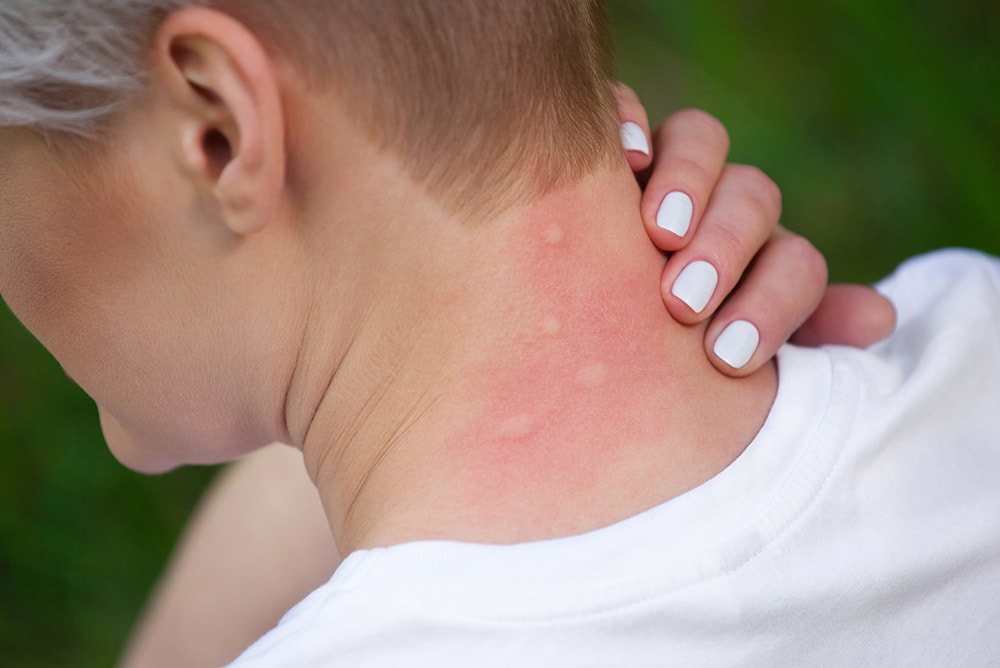
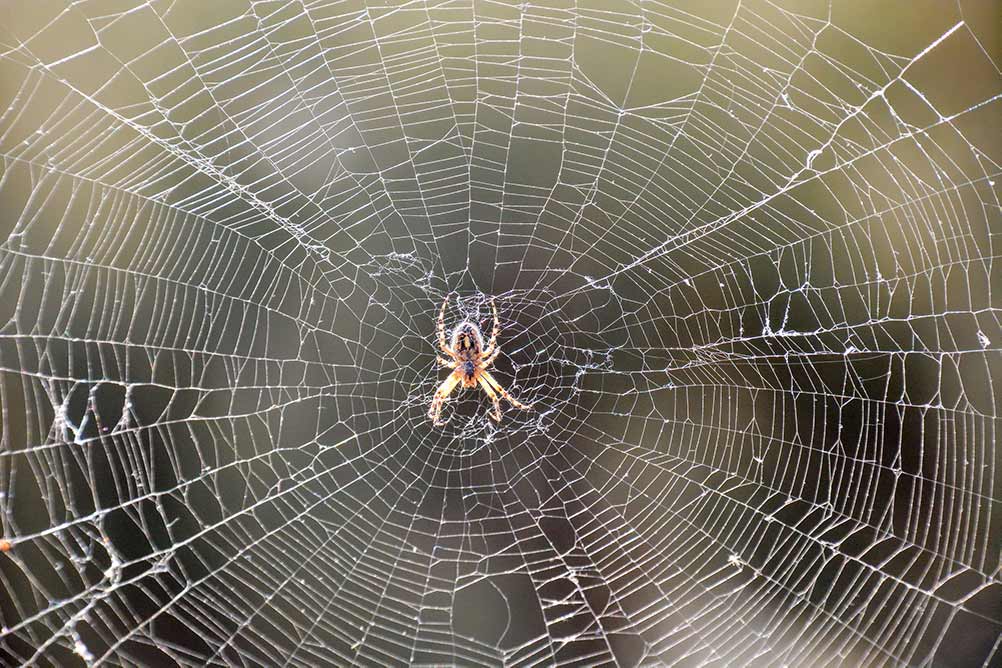
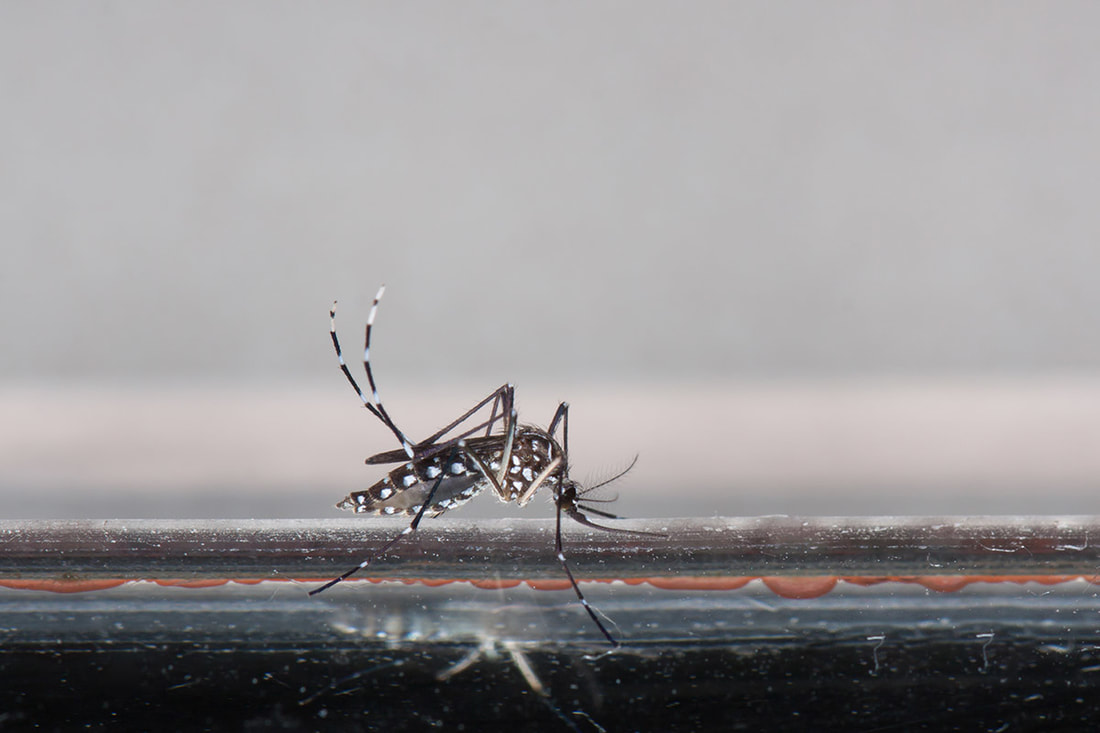
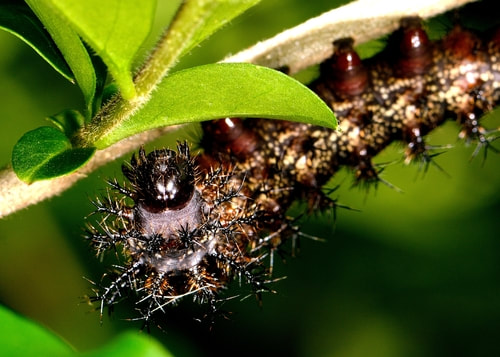
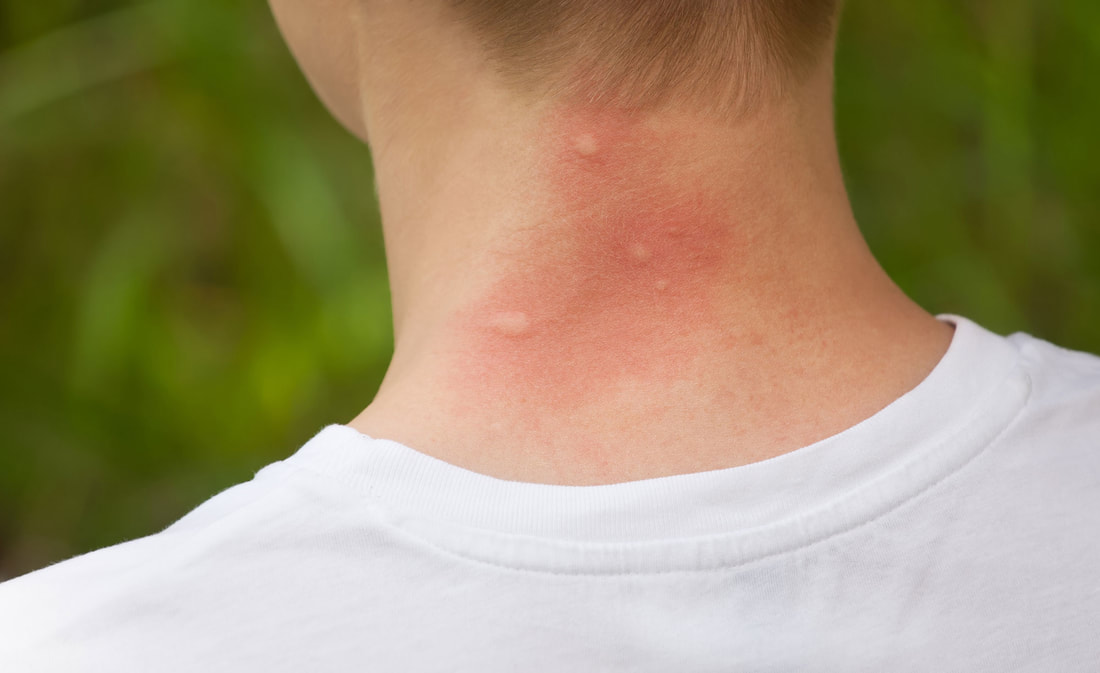
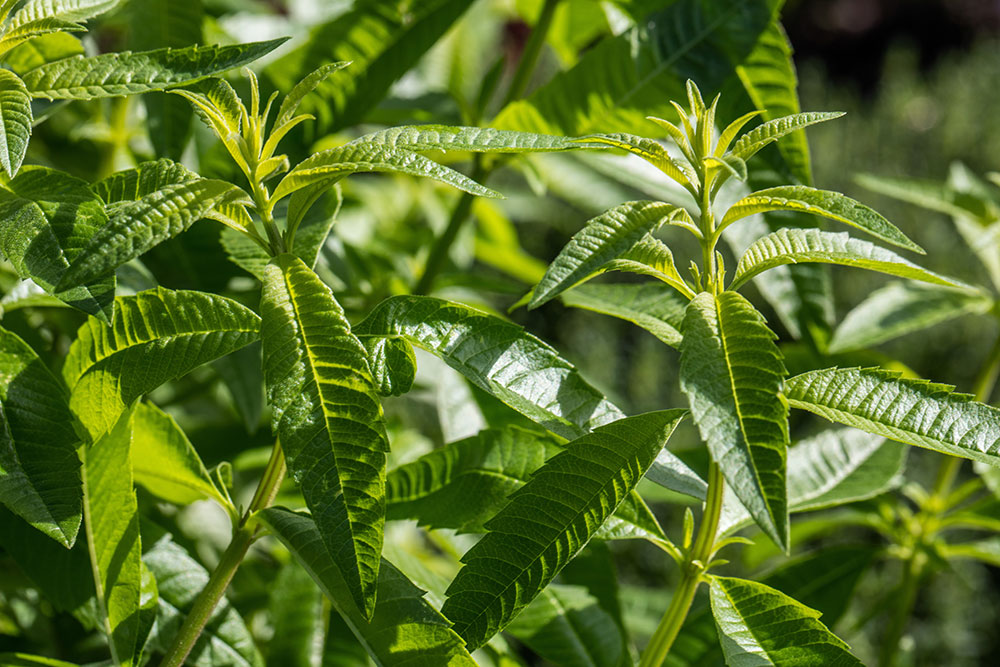

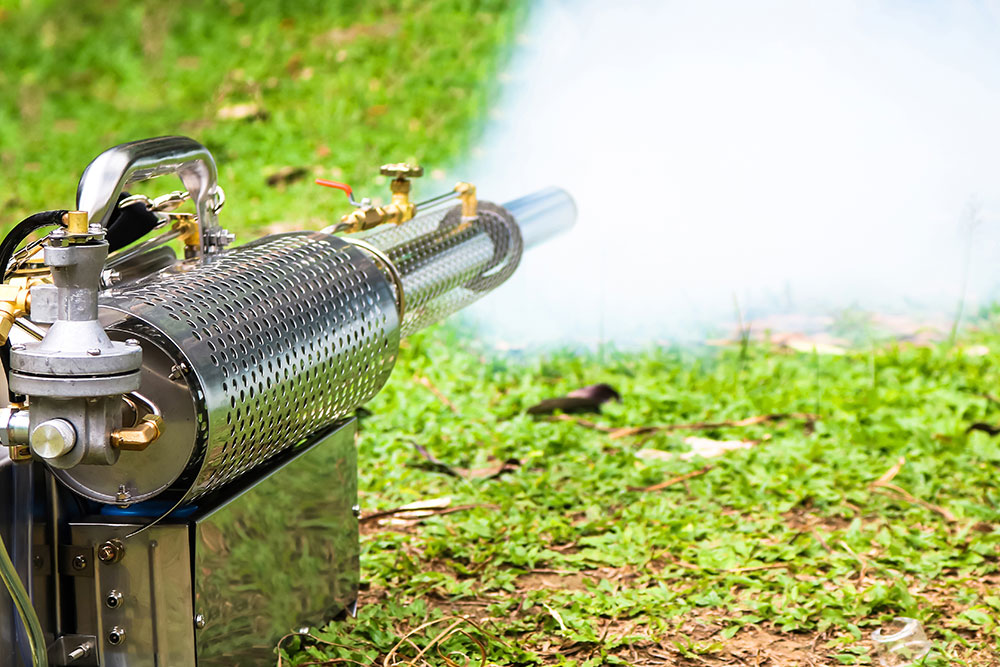

 RSS Feed
RSS Feed

